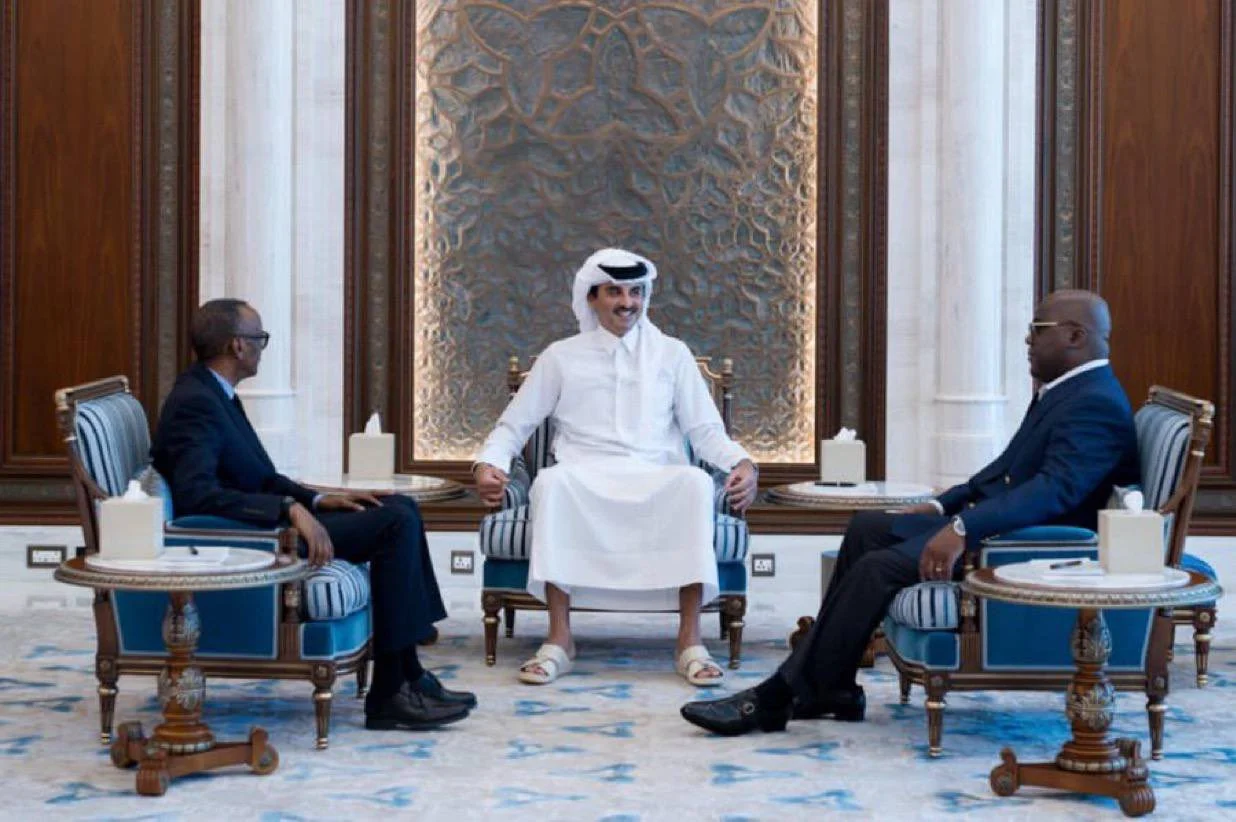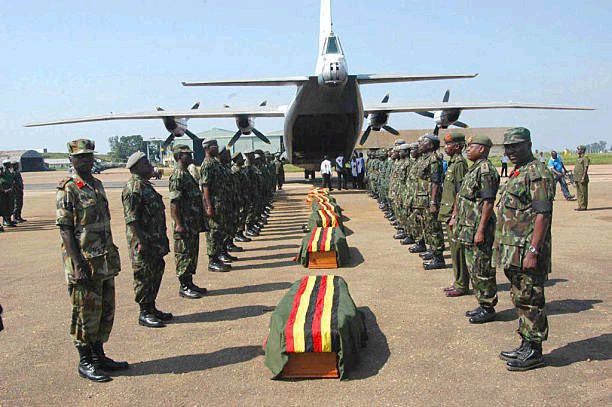News
The High Stakes Behind Kagame and Tshisekedi’s Talks in Doha

Rwandan President Paul Kagame and his Congolese counterpart Félix Tshisekedi met in Doha on Tuesday in a significant diplomatic breakthrough mediated by Qatar’s Emir Sheikh Tamim bin Hamad Al Thani.
The meeting, held at Lusail Palace, marked the first time in months that the two leaders sat across from each other, despite the worsening conflict in eastern DR Congo and growing international pressure.
For over two years, relations between Kigali and Kinshasa have been marked by open hostility, with Tshisekedi accusing Rwanda of backing the M23 rebel group, which has seized strategic towns in North Kivu province.
Kagame has denied the allegations and, in turn, pointed to the presence of the Democratic Forces for the Liberation of Rwanda (FDLR), a militia with links to the perpetrators of the 1994 Rwandan genocide, as a persistent security threat to Rwanda.
Attempts by other African leaders, including Angola’s President João Lourenço, had failed to bring the two to direct negotiations.
But Qatar succeeded where others could not, raising questions about what changed.
Kagame’s office framed the Doha meeting as a reaffirmation of support for the joint East African Community-SADC (EAC-SADC) peace process.
Rwanda also emphasized the need to address the FDLR’s presence in eastern DR Congo and ensure regional security.
Meanwhile, Qatar’s Foreign Ministry hailed the discussions as an important step toward stability in the Great Lakes region. Although no immediate resolutions were announced, the meeting reflected shifting political calculations on both sides.
The fact that Tshisekedi, who had previously likened Kagame to Adolf Hitler, agreed to the talks suggests that Kinshasa’s diplomatic posture may be evolving.
His government had largely dismissed earlier mediation efforts, opting instead for military and diplomatic isolation of Rwanda, including pushing for sanctions.
But with the situation on the ground deteriorating and M23 fighters continuing to gain territory, the Congolese leader may have found it necessary to explore other diplomatic avenues.
Rwanda, on the other hand, has faced increasing international sanctions over its alleged support for M23.
The United States, the European Union, and other Western countries have imposed restrictions on Rwandan officials, suspended military aid, and pressured Kigali to disengage from eastern DR Congo. However, these punitive measures have not altered Rwanda’s position, and M23 remains a dominant force in the conflict.
This is where Qatar’s intervention takes on added significance. Unlike Western nations, which have approached the conflict largely through the lens of punitive measures, Qatar has opted for engagement.
Its interest in mediating the crisis is not purely altruistic—it is also tied to economic stakes in both Rwanda and DR Congo.
Qatar has made substantial investments in Rwanda, including a 49% stake in RwandAir and a controlling 60% share in Bugesera Airport, which is under construction south of Kigali at a cost of at least $2 billion.
These investments make Rwanda one of Qatar’s most significant economic partners in Africa. Meanwhile, Qatar has also signaled its intent to expand its footprint in DR Congo.
After Kinshasa established an embassy in Doha, Qatar pledged to support infrastructure projects, including the renovation of N’djili and N’Dolo airports in Kinshasa and Luano Airport in Lubumbashi.
The Gulf state has also expressed interest in the construction of a deep-sea port at Banana, a venture currently led by UAE-based DP World.
With these economic interests in mind, Qatar’s diplomatic maneuvering appears to be aimed at preserving stability in a region where it is increasingly invested.
By securing a face-to-face meeting between Kagame and Tshisekedi, Qatar has positioned itself as a key broker in a crisis that has defied multiple regional and international mediation attempts.
Whether this latest diplomatic push will yield tangible progress remains to be seen. Despite the meeting in Doha, fighting in eastern DR Congo continues, and M23 has yet to commit to any major concessions.
The Congolese government still demands that Rwanda withdraw its alleged support for the rebels, while Kigali insists that the underlying causes of the conflict—including the FDLR’s presence—must be addressed.
Nonetheless, the fact that Kagame and Tshisekedi were willing to engage in dialogue after months of heightened tensions suggests that the geopolitical landscape is shifting. The failure of previous mediation efforts, the military deadlock, and the economic interests at play may have contributed to bringing the two leaders to the table.
For now, Qatar has succeeded in achieving what others could not: breaking the ice. What comes next will depend on whether the momentum from Doha can translate into lasting diplomatic engagement.

News
First Son Muhoozi Kainerugaba Reveals How 300 Soldiers Killed in Cold Blood

General Muhoozi Kainerugaba has publicly praised the operational capability of the Uganda People’s Defence Forces (UPDF), referring to the army as an effective combat force following a reported confrontation with the White Army militia group.
In a message posted on X, Gen. Muhoozi wrote: “UPDF is made up of cold-blooded killers. It is a killing machine. I’m proud to be the CEO of this great killing machine.”
He further claimed: “Yesterday we killed about 300 White Army in Doma.”
The White Army is a militia associated with the Nuer ethnic group in South Sudan and has previously been involved in armed clashes across the region.
There has been no official communication from the UPDF or Uganda’s Ministry of Defence to confirm the alleged incident or provide further operational details.
The location of Doma, where the alleged clash took place, has also not been independently confirmed.
Ugandan forces have historically participated in regional security operations aimed at stabilizing conflict-prone zones.
Gen. Muhoozi’s remarks highlight what he views as the UPDF’s strength in combat, though questions remain regarding the broader context and implications of the reported operation.
-

 News2 weeks ago
News2 weeks agoKabaka birthday run: Minister Mpanga hails Buganda Lands Board as he calls for more kit purchases
-

 Celebrity Gossip2 weeks ago
Celebrity Gossip2 weeks agoGloria Bugie Excites Netizens With New N-DE Video | WATCH IT HERE
-

 Entertainment2 weeks ago
Entertainment2 weeks agoSpice Diana Addresses Nina Roz’s Body Shaming Comments About Her
-

 Celebrity Gossip2 weeks ago
Celebrity Gossip2 weeks agoLydia Jazmine Opens Up on Her Relationship with Her Exes
-

 Entertainment4 days ago
Entertainment4 days agoFlavia Tumusiime Returns to NTV
-

 Entertainment2 weeks ago
Entertainment2 weeks agoZiza Bafana Urges Beenie Gunter & Nickie Berry to Ensure Positive Co-Parenting Following Breakup
-

 News4 weeks ago
News4 weeks agoShocker As Students Attack Police Station Over Teacher’s Detention
-

 Entertainment2 weeks ago
Entertainment2 weeks agoGloria Bugie Reveals Why Nyash-less Women Hate Her In The Industry


































You must be logged in to post a comment Login